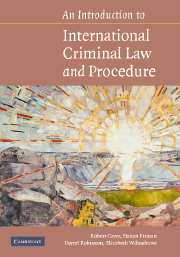Book contents
- Frontmatter
- Contents
- Preface
- Table of Cases
- Table of Treaties
- Table of Abbreviations
- Part A Introduction
- Part B Prosecutions in National Courts
- Part C International Prosecutions
- 6 The History of International Criminal Prosecutions: Nuremberg and Tokyo
- 7 The ad hoc International Criminal Tribunals
- 8 The International Criminal Court
- 9 Other Courts with International Elements
- Part D Substantive Law of International Crimes
- Part E Principles and Procedures of International Prosecutions
- Part F Relationship Between National and International Systems
- Index
- References
9 - Other Courts with International Elements
- Frontmatter
- Contents
- Preface
- Table of Cases
- Table of Treaties
- Table of Abbreviations
- Part A Introduction
- Part B Prosecutions in National Courts
- Part C International Prosecutions
- 6 The History of International Criminal Prosecutions: Nuremberg and Tokyo
- 7 The ad hoc International Criminal Tribunals
- 8 The International Criminal Court
- 9 Other Courts with International Elements
- Part D Substantive Law of International Crimes
- Part E Principles and Procedures of International Prosecutions
- Part F Relationship Between National and International Systems
- Index
- References
Summary
Introduction
The increased interest in combating impunity for international crimes has resulted not only in the creation of international criminal tribunals and courts, but also in other forms of international assistance to the States concerned. There are various reasons for avoiding the resort to a new international tribunal. International institutions, like the ICTY and ICTR, tend to be large and expensive and subsequent calls for similar tribunals have been unsuccessful. Their capacity is limited to a few cases and they have hitherto been located away from the State in question for security or other reasons. In a number of cases, therefore, an alternative has been preferred; the creation of criminal courts with national and international elements to deal with international crimes.
The models developed for Sierra Leone, Kosovo, East Timor, Cambodia and Bosnia and Herzegovina, are described in this chapter. The special courts in Iraq and Serbia are briefly mentioned, as well as one internationalized court (Lebanon) and one domestic court established for a particular trial (the Lockerbie trial).
Each of the models is different, as were their political backgrounds and the legal bases for establishing them. In Sierra Leone and Cambodia, the conflicts were a civil war and persecution by a murderous regime respectively, and the courts result from an agreement between the United Nations and the post-conflict government.
- Type
- Chapter
- Information
- An Introduction to International Criminal Law and Procedure , pp. 149 - 164Publisher: Cambridge University PressPrint publication year: 2007



